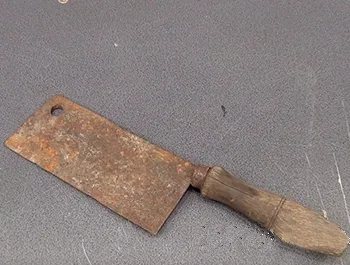
Knives usually rusts tend to attack knives as they are made of steel. And we know steel knives and carbon knives face rusts whenever they come in connection with oxygen and water. Nevertheless, this is a natural phenomenon that you will get to see in all steel knives. Not only that, acidic water and salty water also play a vital role in dragging them towards corrosions. And these are the main reasons why do knives rust generally.
We all have cutleries in our house. If you see while washing those cutleries, some rusts will be apparent there. The reason is cutleries are made of metal and will leave no stone unturned to get engaged with rusts.
Now, we have ample grounds why knives get attacked with rusts and corrosions. Don’t get stressed if you are also struggling with rusts and corrosions in your knife. Here, you will not only get the reason for knives to rust, but also the remedies to cure those rusts.
Is rust on knives dangerous?
Actually rusts are not as dangerous as they seem. However, kitchen knives are more prone to rusts as they are made of steel. Even though rusts may attack your knives, it does not mean that you cannot use them ever.
One thing that will bother you with rusted knives is the impure food preparation. Moreover, rusted knives tend to be unsightly and not convenient to use as well. But if you do not treat your knives right, especially the rusted ones, then they will become unusable day by day.
How to stop knives from rusting
Rusts are a natural thing we get to see in our metals, utensils, and knives especially. Nonetheless, there are lots of techniques to use for removing rusts. Still, we are to go with those traits that would be convenient for us.
Here are some effective steps that can help your knives from rusting.
Keep your knife always dry and clean
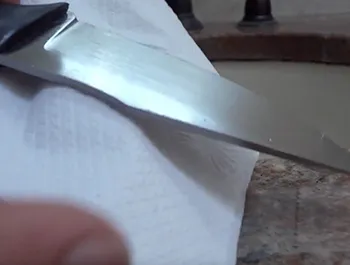
Doesn’t matter if your knife is made of carbon steel or stainless steel, keep it always dry and clean. Nonetheless, it would be the simplest way to keep your knife rust-proof every time.
Do not cut too much acids
Compared to stainless steel, carbon steel tends to have less capability to hold acid. Besides, carbon steel knives tend to react more swiftly and turn out black after being accompanied with acids. So, better cut less acidic foods with carbon steel.
If your knife is of carbon steel try to avoid cutting grapes, oranges, limes, and so on.
Eliminate the use of dishwasher
There are many knives where you will see “dishwasher safe” written. It means your knife will face no problem if kept in a dishwasher. On the other hand, acidic water and salt increases the amount of corrosion in steel and metals.
Also, soaking a metal knife for way too long can also increase rusts and corrosions in knives.
Do regular handwashing
By handwashing your knives, it will be easier for you to budge away the corrosions. The reason is, knives get less in contact with water after being hand washed. Conversely, boiling water and dishwashing soap can make your knife look amazing after every use.
Built a Patina
Mustard and vinegar are superb substitutes to force patina. Ultimately, you need to use a vessel to fill it with lukewarm vinegar and dip your knife there till its top. This technique is for a medium sized knife.
Comparably, large size knives require a muster paste as a fine solution. While using a mustard, mix it with water to make a thick paste. Then apply this paste into your blade and leave for some time. And yes, rinse the blade and dry it as soon as possible.
Use mineral oil
One last thing you can use to remove rust is mineral oil. By applying a layer of mineral oil into your knife, it will increase its longevity. Furthermore, rusts will not find a way to attack your knives too.
How to remove rust from carbon steel
Carbon steel and stainless steel are not so different from each other. If you think stainless steel knives and carbon steel knives require varying steps to get rid of rusts, then you are wrong. Yet, it would be better if you know about their unique steps of backstops.
In order to remove rusts from a carbon steel knife, you will need lots of ingredients. Besides, some essential steps are required to turn your ugly knives into authentic knives. So let us see first what those ingredients are.
- A pre-ground or a cheaper coffee. You can use Nescafé, Folgers, or any other cheap coffee.
- One mean to brew your coffee
- A slender and tall vessel. Or some double stacked coffee cups can also do a better job.
- A carbon steel knife
- A small dish cloth or a sponge cloth
As we have already had a glance of some necessary ingredients, now it is time to go through the steps.
Step 1: Brew your coffee
First thing first, you need to brew a strong coffee. Make sure that the coffee is strong enough for being jittery. Then let your coffee be cold for some time.
Step 2: Get a vessel for your carbon steel knife
Put your dish cloth or small sponge in the bottom using a tall vessel. Then place your knife and tip it down gently.
Pour your chilled coffee in such a way that it can cover the whole blade precisely. Do not submerge your knife’s handle though.
Keep your knife idle into the coffee for about 6 to 8 hours. But if you want the most striking effect, then leave your knife into that solution for about 24 hours.
Step 3: Go for emergence
After waiting for 6 to 24 hours, take out your knife from the coffee solution and wipe it with a damp clean cloth. Hence, your knife will take no time to dry. Consequently, your knife will experience a commendable transformation and will become a lot easier to handle.
Although your carbon steel knife will become rust-resistant than before, do not forget to wipe your blade after each use.
Step 4: Strop your knife after honing
Generally vinegar and lemon patinas are more acidic than coffee forced patinas. Similarly, the acid in coffee reduces the polish of carbon steel, especially on the cutting edges. Prior to ending your process, remember to Hobe and stripe the knife gently.
Step 5: Pull out the coffee fragrance
Well, it seems horrible when the fragrance of coffee remains in your knife. For this reason, cut some yellow onions and pull out all the fragrance of your coffee. If you want you can fry those coffee fragrance onions and have a nice dish for snacks.
Removing rust from kitchen knives
In general, most knives are made of stainless steel. Additionally, carbon steel knives are also being found in kitchens. Again, the common fact is kitchen knives are prone to rusts to a great extent as they get engaged with water and oxygen every time.
Knife rusting is not an unavoidable thing for us. Anyways, removing them can be an easy task if we adopt some genuine traits. Such as-
Use lemon juice
Lemon is a great product to use on kitchen knives for removing rusts. The citric acid of lemon plays a crucial role in killing rusts in metals.
For processing this task, slice a lemon in half and run it on the sides of your rusted metal. For small rust spots, you will need a scrubbing pad. Or if your knife’s rust spot is big, leave the lemon there for about 30 minutes.
White vinegar
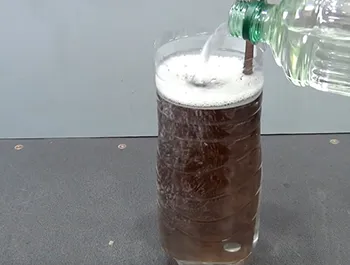
Vinegar is actually a cleansing agent for knives as it has antiseptic properties. Other than that, vinegar contains weak acid, like- acetic acid. What you need to do is leave your knife for about 30 minutes in a bowl filled with water and white vinegar. Next use a steel wool or a scrubbing pad in order to remove rusts properly.
Baking soda
While using Baking soda for removing rust, you first need to make a paste of it by mixing some water. However, you can use a toothbrush to spread the paste all over those rusty parts of your knives. But if your knife is extremely rusty, then a high abrasion will be required.
On the flipping side, some abrasive sponge or steel wool do really make a difference to scrub away the rust particles.
Use citric acid
Citric acid is another important thing to remove rust from knives. Several supermarkets and food stores are providing products of citric acid too. Hence, getting an effective way to remove rusts will not be a hard job for you at all.
As mentioned before, lemon juice is an incredible solution for removing rust from knives. Similarly, lemon juice contains citric acid too. Therefore, using lemon juice or citric acid is not a divergent thing for us.
Using Meta Glo
Usually we get to see some stubborn rusts in our stainless steel and carbon steel knives. In such cases, using a chemical solution like Meta Glo is one of the best remedies. Again, this chemical solution is highly safe for silverwares, cookwares, jewellery, and so on.
One great thing about Meta Glo is, it is a vegetarian product. It means, your food preparations will not get hampered at all and make you relieved from rusts eventually.
How to remove rust from knives with baking soda
Baking soda is a great alternative to remove rust from knives. Anyways, to get rid of those rusts, make a thick paste of baking soda by mixing a definite amount of water with it. Once you have made a thick paste of baking soda, spread it all over your knife’s metal.
Give a check to those rusty spots if they have been covered properly or not. Wait for some time until the paste sits into your knife. It would be better if you let that paste sit for a couple of hours.
Next, scour the paste using a wire brush or steel wool and remove the rusts gently. After that, rinse the paste with water and dry the knife in a click.
How to clean pocket knives
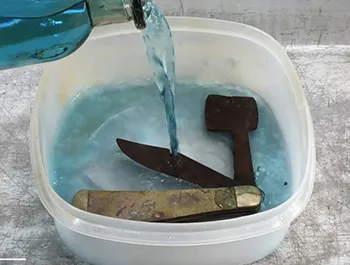
Those who want to keep their pocket knives clean, the below steps are for them. Before that, we are going to discuss what tools you will require before going through the process.
- Toothpicks
- A small brush or a toothbrush
- Q-tips
- Paper towels
- Warm water and a mild soap
- Lubricant, like- gun oil, sewing machine oil, or a mineral oil
Use toothpicks
You see gunk or lint stuck in your knife’s handle. In order to eliminate these objects use toothpicks. As a result, your locking mechanism will become smoother and easy to use. Make sure your knife is dry to have a convenient clean out.
Rinse and scrub your knife
Once you are done with lint and gunk, take your knife towards the sink and run it under warm water. Remember to flush the inside of your knife’s handle as well. Then scrub your knife with a brush by pouring a drop of soap. Besides, you must be certain to remove all contaminants from your knife’s lock mechanism.
Therefore, you will get a secure catch in times of your knife’s open position. Afterwards, scrub the whole knife including its handle.
Clean all the tools precisely
Here, you will need to begin your scrubbing process with utmost carefulness. Just open each tool at a time, especially your Swiss Army style or multi-tool knife. After you have scrubbed all of your tools, put them closely and again open them together. Do not forget to clean your knife tools’ interior bodies.
Well, the Q-tips would be handy for cleaning the inside areas. Also, getting into the grooves and corners will become a cakewalk for you. And yes, rinsing your knife and drying it with a towel are the primary tasks of this process.
Let your tools dry completely
To make sure your knife does not void, never take your knife apart.
Lube your knife properly
Lubricate your knife’s pivot after you make it dry thoroughly. Alongside, lubricate the moving parts and blade for maintaining the smoothness of your knife.
Anyways, there are a good number of lubricants available. Indeed, the petroleum based lubricants are the most popular ones which are highly used in sewing machines. Or if your knife is used for eating purposes, then use the food safe lube.
Conversely, vegetable oils and mineral oils are other important lubricants to use in knives.
Wipe all the mixtures
Dab your lubricants onto the moving parts and hinges without applying too much. But if you have overused your lubricant then wipe the excess of it using a paper towel. Thus, you can avoid the future rusting in your knife.
All in all, stainless steel knives are always prone to rusts and get cured with a simple remedy. Contrastingly, a wooden handled knife requires to be wiped on its handle with a mineral oil.
Knives that don’t rust
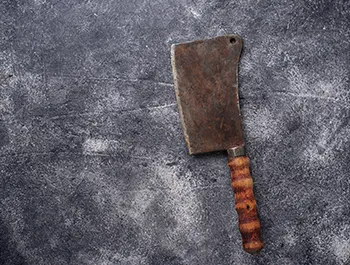
We know, stainless steel is one of the most authentic steels in the market. Likewise, stainless steel knives tend to be the robust ones for sure.
Usually, the stainless steel knives do not rust easily because of the firm materials inside. Even its name says “stainless” which implies no stain on the steel. So it is inevitable that you won’t find rust and stains from stainless steel knives.
Although stainless steel knives do not rust in a simple catch, they do rust sometimes. And the main reason is avoidance towards them. We also know that water and oxygen are the main culprit to rust the steels. And still we make them in connection with water and oxygen.
If proper precautions are taken, you will not see any rusts in your stainless steel knives. In fact, these knives are going to last longer than any ordinary knives.
Comparably, ceramic knives are another substitutes that hardly rust. Like stainless steel knives, ceramic knives also have iron in them. So yeah, stainless steel knives and ceramic knives are a worthy choice to avoid rusts randomly.
Frequently Asked Questions
1. Is it normal for a knife to rust?
A knife tends to get attacked with rusts in our daily lives. We know, almost all knives are made of stainless steel. As said before, water is one of the most common reasons for steels to rust. So whenever you keep your steel knife in a sink or any dishwasher, it will randomly get submerged into water for a long time.
Therefore, corroding and rusting for metal and knives becomes obvious.
#2. How do I keep my kitchen knives from rusting?
To keep your kitchen knives from rusting, do follow some quick steps below:
Clean your knives right after making an utilizationIf you want to get the best results, hand wash your metal knives using dish soap. Remember to dry them instantly as well.
Avoid putting your stainless steel knives in a dishwasher
Do not let your knife stand in water or soak them in the sink
#3. Are there knives that don’t rust?
Well, stainless steel knives are the best in terms of durability. Just like its name, stainless steel does not stain easily. Likewise, finding rusts on these knives is also a hard project. Still, people find some sorts of rusts in their knives because of certain objects.
For instance, putting them in water for a long time, or putting them in a dishwasher can cause rusts in steel knives. If you can avoid such circumstances, no rust will ever attack your knives.
#4. How do you get rust off knives?
Those who want a handy and common solution to remove rusts, white vinegar is perfect for them. To use white vinegar, first take a bowl and fill it with this solution. Then submerge your rusty knife into that bowl and leave it for one night.
Next day you will see that your knife has soaked enough, so just remove that vinegar from your knife and scrub all the rusts off with a wire brush or steel wool
#5. What oil prevents rust on knives?
Nothing but mineral oil prevents rust on knives. Usually, the perfect time of using a mineral oil in a knife is right after using it. To be more particular, you are to use this mineral oil in your knife after you will be washing it with water and dish soap.
If you see, many oils leave a sticky texture in metals. Whereas, a mineral oil ensures to give stainless steel knives a fine coating without any stickiness on them.
Conclusion
Summing up, we got to know that removing rusts is nowhere a difficult task actually. Still, we cannot avoid doing the steps in an accurate way. For this reason you can simply follow the above steps. Prior to that, make sure to acquire the entire idea of why do knives rusts.
At the time of knowing the causes of rusts do not make any further delay to take precautions. Maybe you will not have all the appliances that help to remove rust from knives. In that case, you have options to use any one of the items. For instance, you do not have baking soda at your home right now, but you have lemon juice or vinegar. Thus, without waiting for baking soda you can go with the lemon juice or vinegar.
So, this is all. Hope you have like the mentioned steps and try them now.
Up Next : How To Get Rust Off Kitchen Knives ?
